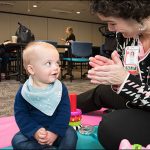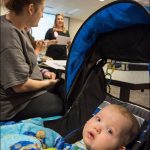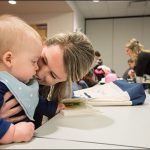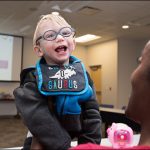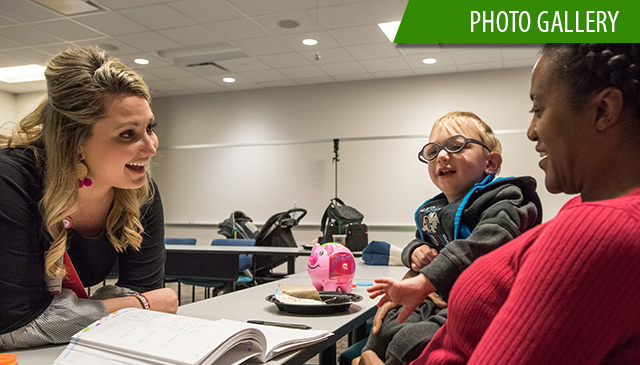
When Nicole Tenney took her daughter Aubree home from the hospital in August of 2017, the last thing on her mind was how often she would talk to her newborn and how she would make connections with her through speech.
All the new mom could think about was whether she was going to be able to make it through the day without having to call one of the many clinicians she and her daughter had gotten to know during their 136-day stay in the Neonatal Intensive Care Unit at Texas Children’s Hospital’s Medical Center Campus.
“Aubree was born at 24 weeks gestation and overcame several challenges while at Texas Children’s,” Nicole said. “But she still had a long way to go, and I was willing to do anything to help keep her moving forward.”
So, when Aubree’s physicians, nurses and therapists with the SOAR Program, also known as the High-Risk Neonatal Follow Up Clinic, at Texas Children’s Hospital The Woodlands suggested that Nicole also participate in the hospital’s upWORDS Program, she jumped at the opportunity.
Developed in association with the LENA Research Foundation and generously supported by Kohl’s Care, Episcopal Health Foundation, Ed Rachel and the Powell Foundation, upWORDS gives parents the knowledge of how to improve the quantity and quality of language spoken with their child and educates them on the long-term impact language can have on their child’s success in life. The program includes group classes where parents learn to use the LENA System™ to monitor their home language environment and are taught simple techniques to increase interactive talk with their child.
To measure a participant’s home language environment, the LENA System™ uses a small recorder that fits inside a vest worn by the child. The recorder measures the amount of words a family speaks to their child and how much their child responds in return. The recording is then translated into data that the parents can use to see how much they are talking to their child and identify opportunities to increase the level of spoken interaction they have with their baby.
Texas Children’s via its Section of Public Health and Primary Care launched the upWORDS program in June 2016 as a pilot program at Texas Children’s Hospital West Campus in partnership with the Section of Public Health and Primary Care and Speech Therapy department at West Campus. Since then, 502 families have participated in the program, which is now being offered at 10 locations across the Greater Houston Area.
Late last year, Texas Children’s extended the program to NICU parents via two sets of classes at Texas Children’s Hospital The Woodlands. The classes are supported by the SOAR Program and several of the therapy teams in The Woodlands. About dozen family members – including Nicole and Aubree – attended the classes, graduating from the program on February 14.
“The biggest thing I learned was to give Aubree a chance to respond to me however she could,” Nicole said. “This and many of the other tips I learned really helped. Aubree’s development in speech increased by seven months during the time we were in upWORDS.”
Maura Dugan, manager of the Section of Public Health and Child Abuse Pediatrics, said some parents in the NICU classes increased the number of words spoken to their children by 25,000, and that 84 percent of upWORDS participants who graduated from upWORDS classes last year reported they spoke more to their children, and 79 percent reported an increase in the number of conversational turns or instances of back and forth verbal exchanges between them and their children.
Dugan said the NICU classes in particular have been a huge success as the majority of the participants are dealing with a lot of issues and greatly needed the support of experts as well as other parents who are going through similar things.
Led by upWORDS Health Educator Jennifer Howell and Listening and Spoken Language Therapist Allison Haggerty, the NICU classes not only teach parents and caregivers the importance of early talk and turn taking, but how to implement talking tips into their everyday routine like singing, pausing and chatting while out and about with their baby.
“With the help of staff and each other, parents work through some of the challenges they face in everyday life,” Dugan said. “And, each week they get to watch their children interact and achieve various milestones.”
Dr. Candice Allen, medical director of the SOAR Program, has helped get the upWORDS NICU class started and said they are a great addition to the services her team already provides families who are transitioning from the NICU to home.
“The more support we can give these parents and babies the better,” she said. “We want them to go on to lead healthy and productive lives, and language is a big part of that.”
To learn more about or register for the upWORDS program at Texas Children’s, click here.


